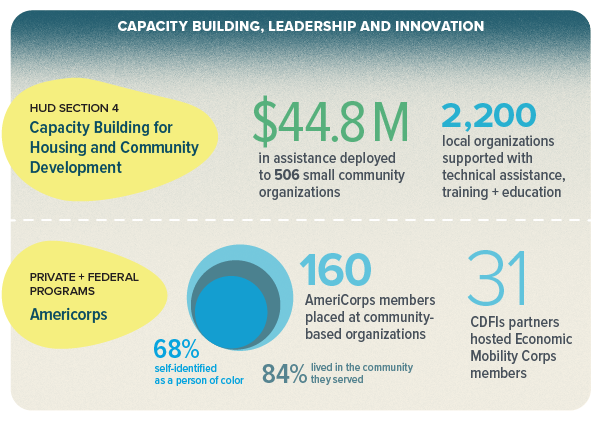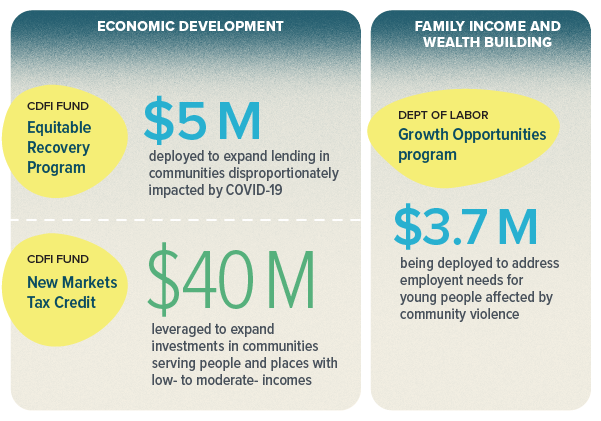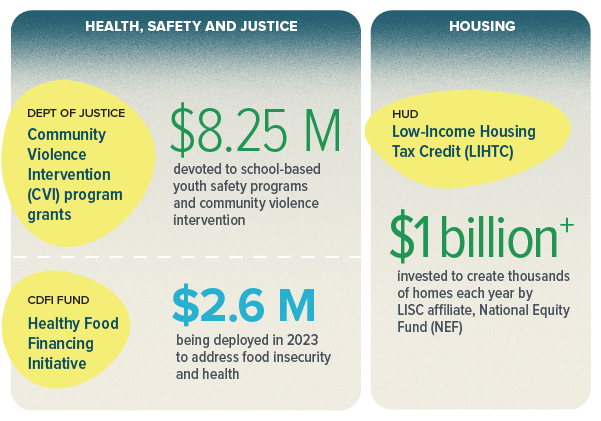In a new blog, LISC’s Matt Josephs connects the dots from community development policy discussions to actual funding streams, highlighting positive local outcomes that would not otherwise move forward. "It would be nearly impossible to unlock the tens of billions of dollars of private financing needed each year to scale up progress without strong federal support,” he writes. "We are grateful for the confidence federal agencies have shown in LISC and others in the community development finance field…"
This spring, LISC released its 2023-2024 policy priorities, highlighting critical federal programs and policy proposals across seven broad areas of community and economic development. With Congress now in the midst of its work on appropriations bills, and with critical tax legislation now introduced and potentially in play for a year-end tax package, we thought it would be a good time to look at some of these programs in action and consider how organizations like LISC leverage them to promote an agenda of equity and economic opportunity.
Capacity Building, Leadership and Innovation
LISC’s foundational mission is to build the capacity of local community development organizations so they can effectively invest in their neighborhoods, and HUD’s Section 4 Capacity Building for Housing and Community Development Program is critical to this effort. Over the past five years, LISC has deployed $44.8 million of Section 4 assistance to 506 mostly small, mostly minority-led community organizations in urban and rural communities. Section 4 has also supported more than 2,200 local organizations with technical assistance, training and education from LISC and our grantees. We'd like to see this important program robustly funded for FY 2024.

Talent development is also a key aspect of capacity building. With both federal and private-sector support, LISC places approximately 160 AmeriCorps members at community-based organizations each year. We are also an administrator of the federal Economic Mobility Corps program, placing AmeriCorps members at certified CDFIs throughout the country. Last year we partnered with 31 different CDFIs on this initiative, and we are on pace to double that number this year.
Capacity building extends to municipalities as well. We work through HUD’s Distressed Cities Technical Assistance (DCTA) initiative to support small and distressed cities–-particularly those recently impacted by a natural disaster. The goal is to help them improve their financial management and ability to deploy HUD dollars—which ultimately benefits residents, businessowners and communities.
Economic Development
The Community Development Financial Institutions Fund (CDFI Fund) is a critical federal resource that facilitates a wide range of economic development investments. In April, for example, the CDFI Fund awarded $1.7 billion in funding to 603 CDFIs—including $5 million for LISC—through the Equitable Recovery Program to expand lending in communities that have been disproportionately impacted by COVID-19.
Those grants are in addition to core programs like the CDFI-Financial Assistance program, which helps CDFIs lower the cost of funds for our borrowers, and the New Markets Tax Credit program, which awarded $5 billion in investment authority in its latest round of allocations, including $40 million for LISC. We are leveraging the award to expand our investments in a range of community projects, like health facilities, grocery stores, schools, shopping centers, manufacturing centers and recreational facilities—all serving people and places with low-to-moderate incomes. The program expires in 2025, and we need to make this a permanent part of the tax code.
Federal programs also help support small business growth, like the Small Business Administration’s Community Navigator Pilot Program. It is designed to connect underserved businesses to management and technical services that help them grow. LISC is grateful to be funded by the program to help build a stronger ecosystem of support for entrepreneurs, working with business development organizations across the country to deliver services. It’s a pilot program, and we’d like to see this permanently authorized and its funding stream continued.

Family Income and Wealth Building
LISC has strongly advocated for Congress to reauthorize and fully fund the Workforce Innovation and Opportunity Act (WIOA), which builds the capacity of community-based organizations to equitably serve residents and their communities. For example, LISC is one of three organizations recently funded by the Department of Labor (DOL) Growth Opportunities program, authorized by WIOA, which focuses on preparing justice-involved youth and young adults for the workforce. LISC’s Family Income and Wealth Building team is deploying the $4 million grant to address employment needs for young people deeply affected by community violence.
Digital inclusion is also a key aspect of equity for families and businessowners, especially in underserved rural areas. We have strongly supported federal efforts to invest in rural broadband, while at the same time advancing programs like LISC Digital Connectors, which helps equip people with the skills and devices needed to participate in online commerce, education, health and entertainment.
Education
There are myriad ways that federal policy can support equitable educational opportunities in urban and rural communities. It’s why we have so strongly advocated for federal investments in child care programs. Though emergency relief funds have helped child care centers manage and recover from COVID-19 in recent years, there are still no dedicated, stand-alone federal resources to support the acquisition, construction, or renovation of child care facilities. When stabilization funds end next year, the 88 percent of child care providers that are using them to help pay personnel costs and keep programs staffed will face difficult decisions—and our communities may find themselves in a worsening child care crisis. LISC works directly with philanthropic funders and child care providers to help address these challenges.
We are also eager to see more federal support for charter school facilities, like the Department of Education’s Credit Enhancement for Charter Schools program, which makes it more affordable for charter operators to build and upgrade facilities. This is a question of equity: the 7,000 charter schools across the country largely serve families of color, especially children coming from families with low-to-moderate incomes. Those students deserve access to quality schools.
Health, Safety and Justice
LISC views community development both as a strategy to build equity and opportunity and as a comprehensive way to address social determinants of health, including community safety. For example, the Department of Justice (DOJ) awarded LISC four grants to advance school-based youth safety programs and community violence intervention. These efforts build on LISC’s long-standing work with the DOJ, having been its partner in community safety programs for more than 20 years – and we continue to support additional federal funding for Community Violence Intervention programming at DOJ.
We are also leveraging federal resources to expand access to health services, particularly through federally qualified health centers (FQHCs), and healthy food in food deserts. The CDFI Fund’s Healthy Food Financing Initiative (HFFI), for example, delivered $23 million to eight CDFIs this year to address food insecurity and health, including $2.6 million to support LISC’s work. We are using that funding to fuel farmers markets, grocery stores, food incubators and other food-related projects that serve people and communities with low incomes.

Housing
We are urging Congress to expand the Low-Income Housing Tax Credit (LIHTC) program, through which LISC’s affiliate, National Equity Fund, invests more than $1 billion to create thousands of homes each year, as well as to strengthen the Section 8 Housing Choice Voucher program, the HOME program and Capital Magnet Fund. All are vital to building and preserving multifamily housing for families with low incomes.
We are also deeply committed to enacting the Neighborhood Homes Investment Act, which would support development and renovation of starter homes in low-income communities, making it possible for developers to build in areas where property values might make it difficult to recoup their investment while also giving more families the chance to own a home.
These programs are just a snapshot of how the federal government seeds and accelerates high-impact community development plans. It would be nearly impossible to unlock the tens of billions of dollars of private financing needed each year to scale up progress without strong federal support. We are grateful for the confidence federal agencies have shown in LISC and others in the community development finance field more broadly, and eager to get to work on our ambitious policy agenda for the rest of 2023.
For more on our ongoing advocacy efforts, take a look at LISC’s Policy Priorities 2023-2024, follow our policy team on Twitter, and check out our web postings at www.lisc.org/policy.
ABOUT THE AUTHOR
 Matt Josephs, Senior Vice President, LISC Policy
Matt Josephs, Senior Vice President, LISC Policy
Matt manages the team that is responsible for developing LISC’s federal policy agenda; communicating this agenda to LISC employees, board members, funders and other stakeholders; and pursuing this agenda through engagement with members of Congress and other federal officials.
@LISC_policy